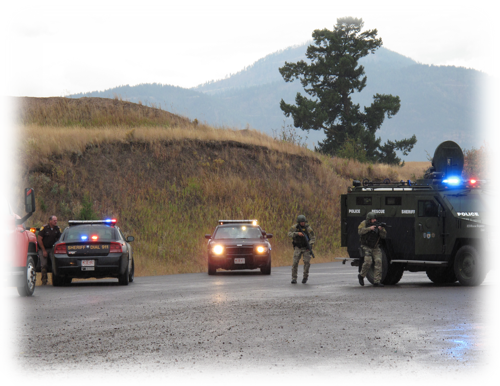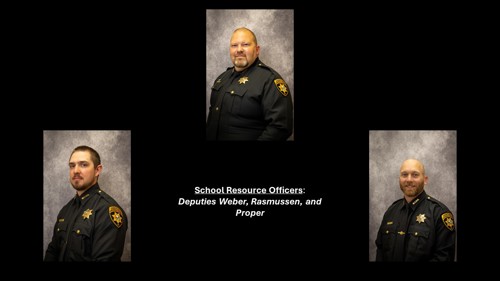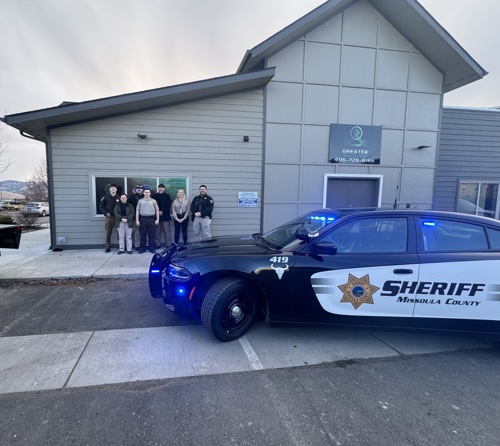Administrative Division
The Sheriff's Office has an Administrative Captain (AC), assisted by an Administrative Lieutenant, who works on finding, applying for and administering grants. The AC administers the budget, coordinates external hiring and internal promotions, as well as managing the Sheriff's Office fleet.
The AC serves as the Chief Deputy Coroner and plays a vital role in serving the community by investigating deaths to determine their cause and manner.
In addition to serving as Chief Deputy Coroner, the Administrative Captain and Lieutenant oversee several units and special teams.
These include the K-9 Units, Special Response Team (SRT), the Reserve Deputy Unit, Civil Deputies, School Resource Officers, Missoula County Sheriff's Office Cadets, and Bailiffs and Special Security Officers.

Captain Michael Hash
Captain Hash started his career at the Missoula County Detention Facility in May of 2006. There he served as a Detention Training Officer and a member of the Disturbance Response Team.
In 2010, he was hired on as a Patrol Deputy for the Missoula County Sheriff's Office. During his career, Captain Hash has served as a Field Training Officer, Corporal, Patrol Sergeant, Training Sergeant, Detention Captain, and now as the Administrative Captain and Chief Deputy Coroner.
Captain Hash also performed several ancillary duties such Senior Operator, Negotiator, Special Response Team member, and Deputy Coroner.

Lieutenant Josh Volinkaty
Lieutenant Volinkaty started his law enforcement career as a Reserve Deputy for the Missoula County Sheriff’s Office in 2008. In 2009, he was hired by the Missoula Police Department where he was employed for 5.5 years.
In April 2015, Lieutenant Volinkaty joined the Missoula County Sheriff’s Office as a Patrol Deputy. Since that time, he has served as a Field Training Officer, Corporal, Detective, Patrol Sergeant, and Special Teams Sergeant, and Special Response Team (S.R.T) member .
In his current role as the Special Teams Lieutenant, he also serves as a Deputy Coroner, Crisis Negotiator (C.N.T), and Search and Rescue Coordinator.
Coroner Unit
As Chief Deputy Coroner, the AC ensures a thorough investigation is conducted on all unattended, unexpected, and suspicious deaths. They also ensure timely and compassionate notifications are made regarding a loved one's passing. They work closely with state and area law enforcement agencies as needed.
The County Coroner’s Office is committed to serving the community with dignity and transparency while upholding the highest standards in forensic death investigation.
K-9 Units
Information about our K-9 Officers and handlers can be found Here
Special Response Team (SRT)

The Special Response Team's purpose is to handle "high risk" situations. These situations include barricaded subjects, hostage rescue, high risk fugitive arrests or search warrants, protective services, crowd control, institutional riots, and special event management. Members of this unit are trained and work as a team. SRT provides 24-hour coverage by means of a pager call-out to provide immediate response upon request.
SRT has four components. The first is the most well-known, the Tactical team. Officers are trained as entry, arrest, sniper/observer teams. They work with less lethal options, handguns, long guns, and chemical weapons.
The Negotiations team is trained to deal with hostage-takers, barricaded suspects, and suicidal persons.
The Tactical Emergency Medical Services involves EMT and paramedics who receive some tactical training, and who provide treatment for injured victims, officers, and suspects.
The Support team provides clerical assistance with record-keeping, monitoring radio traffic, and providing support to the other three parts of the team.
Civil Deputies
Civil Deputies, who are also attached to the Patrol Division play a crucial role in upholding the justice system by ensuring legal documents are properly served and enforced.
This role ensures due process by delivering legal documents efficiently and professionally.
Primary Duties:
- Coordination with Courts & Attorneys: Collaborates with judges, legal representatives, and law enforcement agencies to ensure proper execution of civil processes.
- Serving Legal Documents: Delivers summonses, subpoenas, court orders, evictions, and other civil papers to individuals and businesses.
- Executing Court Orders: Enforces writs, such as evictions, property seizures, wage garnishments, and repossessions as ordered by the court.
- Eviction Assistance: Works with landlords, tenants, and courts to carry out lawful evictions while maintaining order and ensuring compliance with legal requirements.
- Domestic Relations Orders: Serves restraining orders, child custody orders, and protection orders to safeguard individuals and families.
- Maintaining Records: Documents all service attempts, completed services, and enforcement actions to provide accurate legal records.
School Resource Officers

School Resource Officers (SROs) play a crucial role in maintaining a safe and supportive learning environment while also acting as a bridge between law enforcement and the school community.
Your SROs are sworn law enforcement officers responsible for ensuring safety and security in our schools. Their duties typically include:
- Law Enforcement & Safety
- Mentoring & Counseling
- Education & Prevention
- Crisis & Emergency Management
- Community Engagement
In addition to our three full-time SROs, many of our patrol deputies regularly check-in at our local schools that do not have a designated SRO.
Reserve Deputy Unit
Reserves supplement the force of deputies by performing routine patrol duties, as well as providing additional officers for special events and extraordinary incidents.
Candidates undergo a rigorous selection process and are required to complete state-mandated training prior to being sworn in as reserve deputies. They wear the same uniform and have the same arrest power as deputy sheriffs while on duty.
Requirements (7-32-213 MCA):
Applicants will complete a written application, undergo aptitude testing and be reviewed by an oral interview board.
- Age: State law dictates that applicants must be at least 18 years old.
- Education: Must have high school diploma or equivalent.
- Residency: Must be a citizen of the United States, a resident of the State of Montana for at least one year, and a resident of Missoula County for at least six months prior to appointment.
- Drivers License: Must possess a valid Montana drivers license.
- Background: Must be of good moral character as verified by fingerprint check and thorough background investigation.
- Physical Condition: Must be examined by a licensed physician within 30 days immediately preceding the date of appointment and pronounced in good physical condition.
Training:
More than 180 hours of academic presentation (exceeding that required by State law) and practical, hands-on instruction are designed to impart the knowledge required of law enforcement officers. This ensures the trainee is fully capable of performing the duties of the position. Each Reserve Deputy is observed, counseled, and evaluated to determine his or her readiness to assist Patrol Deputies in various law enforcement assignments.
Training opportunities continue to be made available throughout the Reserve Deputy's career.
For more information, please call 406-258-4810.
Sheriff's Office Cadets

Cadets are high school aged students who are interested in Law Enforcement, either as a future career, or as an after school activity. Cadets receive law enforcement training and learn specifics about the Missoula County Sheriff's Office.
Cadets receive instruction and field experience in jail procedures, radio dispatch procedures, Montana Criminal Code, and other procedures used in the officer’s daily patrol duties. Films are shown and discussed, and guest speakers from related areas in law enforcement are scheduled to speak. Cadets are exposed to possible careers in law enforcement as a result of the speakers.
Bailiffs & Special Security Officers
Often the first individuals you will encounter when entering the Missoula County Courthouse, Special Security Officers greet and answer general questions from the public as they enter.
They conduct safety sweeps of the courthouse and departments at the beginning and end of each day and monitor video surveillance throughout the courthouse and the courthouse lawn.
They open the courtrooms and conduct safety sweeps before and after each court session. They also provide security and a law enforcement presence in District Court, which is required by Montana Code Annotated, and provide security for Justice Court hearings.
It is their duty to handle jury's during jury trials in both District and Justice court. They also take individuals into custody at direction of the judges when the judges sentence individuals to jail.
Considering all possibilities, your Special Security Officers are instrumental in planning for evacuation guidance and planning for safety in and around the Courthouse.


